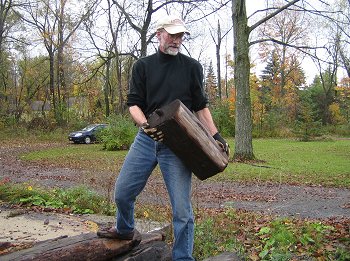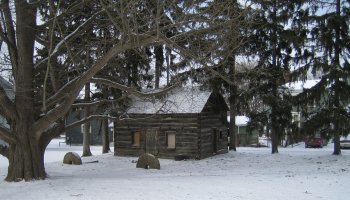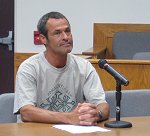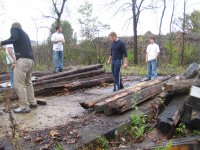- By Dan Veaner
- News
 Print
Print
Two hundred and fifty nine years after it was first built by the North family in the center of what is now Lansing, the oldest remaining log cabin in Tompkins and Cayuga Counties will likely be reassembled in its home town this year. But before that happens the cabin must face one last hurdle: where? "Chris offered to put this log cabin up free of charge," Lansing Town Supervisor Scott Pinney told the Town Board last week. "Any materials that are needed he would spend his own money to buy the materials himself. He has his own property that he can put it on. I think we should move forward and allow that to happen."
But Councilman Bud Shattuck said that giving the cabin to Muka would be jumping the gun. "Chris offered this last year," he said. We looked at the property. We actually had our highway department come and look at the property. And it was completely ill suited for putting the cabin there. While the space is there the configuration isn't there."

Councilman Bud Shattuck holding a piece of the North Log Cabin last Fall
The opportunity to bring the cabin home to Lansing arose nearly four years ago when the Cayuga Museum in Auburn contacted the Town of Lansing to say that they wanted the space the cabin occupied for other uses. Museum officials offered it to the town of its origin, saying that it would be sent to a landfill if the Town didn't want it. Shattuck took up the challenge of bringing the cabin home with no funding and no chance of using taxpayer monies.
With the museum's deadline past, the town highway department disassembled and tagged the pieces of the cabin in May of 2007 and brought it back to be stacked under a tarp for the winter. Shattuck took advantage of a free program that offers Cornell student volunteers to work on community projects to get the logs neatly stacked on a concrete slab and covered with a tarpaulin to protect the fragile pieces from further decay. Some of the logs were already in bad shape from age and rot.
 Now town officials are concerned that if the cabin is not reassembled right away that the remaining logs will rot to the point where it will be impossible to restore the building. "If we are going to delay who gets it and where it's going to go, I don't want to delay too long," said Councilman Marty Christopher. "I say we set a time right now. If we're going to ask anyone else who may be interested I say 60 days... 30 days or at the most 60 days to give people an opportunity. Let's set a timeframe right now. If at the end of that timeframe Chris is the only one my feeling is we let him take it over. If not -- if someone else comes in we will have an opportunity to discuss it further."
Now town officials are concerned that if the cabin is not reassembled right away that the remaining logs will rot to the point where it will be impossible to restore the building. "If we are going to delay who gets it and where it's going to go, I don't want to delay too long," said Councilman Marty Christopher. "I say we set a time right now. If we're going to ask anyone else who may be interested I say 60 days... 30 days or at the most 60 days to give people an opportunity. Let's set a timeframe right now. If at the end of that timeframe Chris is the only one my feeling is we let him take it over. If not -- if someone else comes in we will have an opportunity to discuss it further."
Shattuck agreed and asked for 60 days to find a better situation for the cabin. "It may be the best thing to do , but I think it's really early in the game to do that," he said. "I think that a little energy on my part may bring other people with other offers, and there may be better opportunities. If we're going to use it... If we're going to save the cabin and say that it is part of town history then we want to have people able to see it. They ought to be able to see it where there's parking that is easy and accessible that's tied into something. Again I'm not against Chris and his offer. I just think that it's early to do that. I'd rather move forward and look at the other options that are there."

The North cabin at the Cayuga Museum before being
disassembled and transported to Lansing last year
There are advantages and disadvantages to Muka's offer, one that everyone recognizes as a generous gift to the town. Muka offers the whole package: a place to erect the cabin, the labor to do so, and ongoing care and maintenance under the umbrella of his Common Field, Inc. 501(c)(3) not-for-profit corporation. "It could be used in any way that the town would like," Muka told the board. "Common Field would like to use the cabin and offer a local history lecture or presentation in that cabin once a month. It could be more often, or less often depending on what the demand may be. It could also be for special occasions. Let's say a school class wants to come in. That could be arranged."
 But the disadvantages are that the land on Salmon Creek Road was deemed too small when the town highway department inspected it last year. It is a small wedge of street-front land with a steep hill or cliff at the back, limiting the amount of space that can be used. While the cabin could fit on it, there isn't room for parking. Children visiting the cabin would be close to the road. And the Salmon Creek site is remote, prompting the criticism that it is not accessible for tourists who might be attracted to the cabin if it were located nearer the town center or Myers Park.
But the disadvantages are that the land on Salmon Creek Road was deemed too small when the town highway department inspected it last year. It is a small wedge of street-front land with a steep hill or cliff at the back, limiting the amount of space that can be used. While the cabin could fit on it, there isn't room for parking. Children visiting the cabin would be close to the road. And the Salmon Creek site is remote, prompting the criticism that it is not accessible for tourists who might be attracted to the cabin if it were located nearer the town center or Myers Park.
But Muka says that parking is a non-issue. Since last year he has sold another parcel to Common Field that he says has enough room for from ten to twenty parking spaces. And noting Town Attorney's concerns about the town giving a public piece of property like the cabin to an outside entity Muka argues that because the Common Field is a not for profit 501-C3 corporation dedicated to historical and natural conservation, preservation, and recreation it may be the only entity in Lansing that the town can legally give the cabin to. He also notes that because the small plot is part of the original North farm and that may qualify the cabin for grant monies it couldn't otherwise get.
Muka conducted extensive research along with Shattuck and others in an attempt to locate the original spot. They pinpointed an area just west of the intersection of Conlon and Searles Roads as the likely original plot. It is known that the cabin was moved to 578 Conlon, a bit north of Searles Road in 1844. Over the next hundred years it was engulfed into a more modern house and was only rediscovered in 1958 when some clapboard was removed for repairs. At that time it was transported to the Auburn museum until it came back to Lansing last year. So while its last 150 years is solidly accounted for, its exact place of origin is unsure. However, it is known which of the military plots it was built in and the Salmon Creek Road location is within the right one.
 Shattuck says that he isn't against the cabin going to Muka, but that if there are better alternatives he wants the chance to find them. "I am looking to a number of things," he said. "Getting information to look at and talking to the local historical society, doing a number of things, polling the board. There was mixed feeling on the board as to what we should do with that. I'm always a person to look at the history of the community and say that it's far more important than what you think it is at the time. Especially our children as to what their view of things are."
Shattuck says that he isn't against the cabin going to Muka, but that if there are better alternatives he wants the chance to find them. "I am looking to a number of things," he said. "Getting information to look at and talking to the local historical society, doing a number of things, polling the board. There was mixed feeling on the board as to what we should do with that. I'm always a person to look at the history of the community and say that it's far more important than what you think it is at the time. Especially our children as to what their view of things are."
Shattuck applauded Muka for petitioning the Zoning Board of Appeals to ask for setbacks to move the cabin closer to the road so he doesn't have to do major excavation if the cabin ends up there. But he said that other options could be more advantageous for the town. "There are questions about parking and many other questions," he said. "I think this is really premature."
"I feel this thing is something we should put some energy into now and try to get a home for it," Pinney said. "The longer it sits there the more the materials will rot away and we should look into this."
He agreed to Shattuck's request for 60 days to find a better home, saying it would be on the August meeting agenda. The good news is that no matter what the outcome, Lansing's oldest log cabin will be rebuilt and have a home in the town of its origin.
----
v4i25
But Councilman Bud Shattuck said that giving the cabin to Muka would be jumping the gun. "Chris offered this last year," he said. We looked at the property. We actually had our highway department come and look at the property. And it was completely ill suited for putting the cabin there. While the space is there the configuration isn't there."

Councilman Bud Shattuck holding a piece of the North Log Cabin last Fall
With the museum's deadline past, the town highway department disassembled and tagged the pieces of the cabin in May of 2007 and brought it back to be stacked under a tarp for the winter. Shattuck took advantage of a free program that offers Cornell student volunteers to work on community projects to get the logs neatly stacked on a concrete slab and covered with a tarpaulin to protect the fragile pieces from further decay. Some of the logs were already in bad shape from age and rot.

Click To See Time Line
Shattuck agreed and asked for 60 days to find a better situation for the cabin. "It may be the best thing to do , but I think it's really early in the game to do that," he said. "I think that a little energy on my part may bring other people with other offers, and there may be better opportunities. If we're going to use it... If we're going to save the cabin and say that it is part of town history then we want to have people able to see it. They ought to be able to see it where there's parking that is easy and accessible that's tied into something. Again I'm not against Chris and his offer. I just think that it's early to do that. I'd rather move forward and look at the other options that are there."

The North cabin at the Cayuga Museum before being
disassembled and transported to Lansing last year
There are advantages and disadvantages to Muka's offer, one that everyone recognizes as a generous gift to the town. Muka offers the whole package: a place to erect the cabin, the labor to do so, and ongoing care and maintenance under the umbrella of his Common Field, Inc. 501(c)(3) not-for-profit corporation. "It could be used in any way that the town would like," Muka told the board. "Common Field would like to use the cabin and offer a local history lecture or presentation in that cabin once a month. It could be more often, or less often depending on what the demand may be. It could also be for special occasions. Let's say a school class wants to come in. That could be arranged."

Chris Muka
But Muka says that parking is a non-issue. Since last year he has sold another parcel to Common Field that he says has enough room for from ten to twenty parking spaces. And noting Town Attorney's concerns about the town giving a public piece of property like the cabin to an outside entity Muka argues that because the Common Field is a not for profit 501-C3 corporation dedicated to historical and natural conservation, preservation, and recreation it may be the only entity in Lansing that the town can legally give the cabin to. He also notes that because the small plot is part of the original North farm and that may qualify the cabin for grant monies it couldn't otherwise get.
Muka conducted extensive research along with Shattuck and others in an attempt to locate the original spot. They pinpointed an area just west of the intersection of Conlon and Searles Roads as the likely original plot. It is known that the cabin was moved to 578 Conlon, a bit north of Searles Road in 1844. Over the next hundred years it was engulfed into a more modern house and was only rediscovered in 1958 when some clapboard was removed for repairs. At that time it was transported to the Auburn museum until it came back to Lansing last year. So while its last 150 years is solidly accounted for, its exact place of origin is unsure. However, it is known which of the military plots it was built in and the Salmon Creek Road location is within the right one.

Cornell students stacking the disassembled cabin for the winter
Shattuck applauded Muka for petitioning the Zoning Board of Appeals to ask for setbacks to move the cabin closer to the road so he doesn't have to do major excavation if the cabin ends up there. But he said that other options could be more advantageous for the town. "There are questions about parking and many other questions," he said. "I think this is really premature."
"I feel this thing is something we should put some energy into now and try to get a home for it," Pinney said. "The longer it sits there the more the materials will rot away and we should look into this."
He agreed to Shattuck's request for 60 days to find a better home, saying it would be on the August meeting agenda. The good news is that no matter what the outcome, Lansing's oldest log cabin will be rebuilt and have a home in the town of its origin.
----
v4i25



